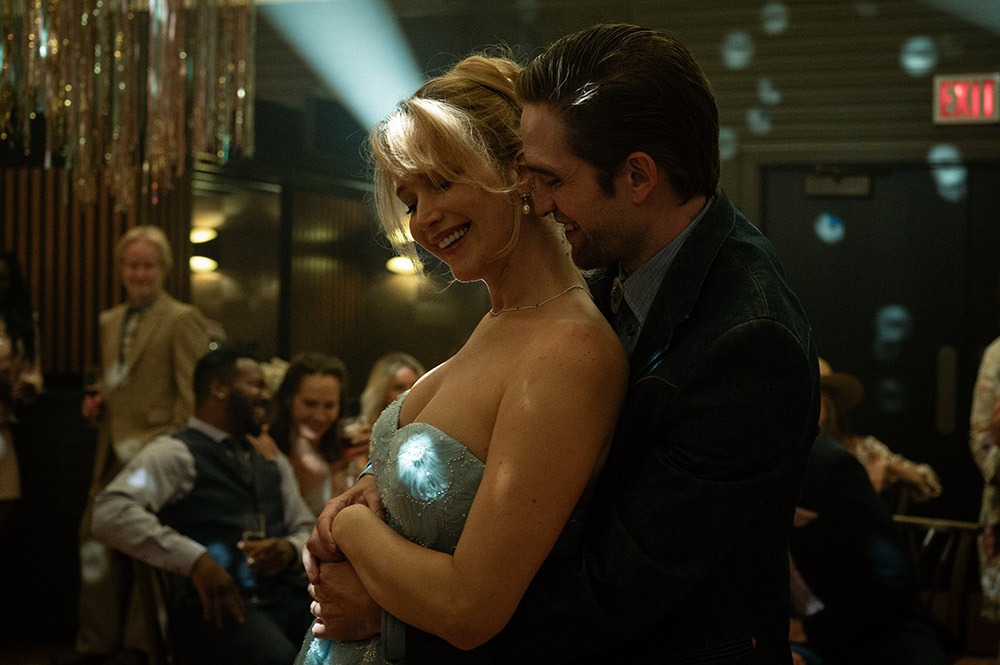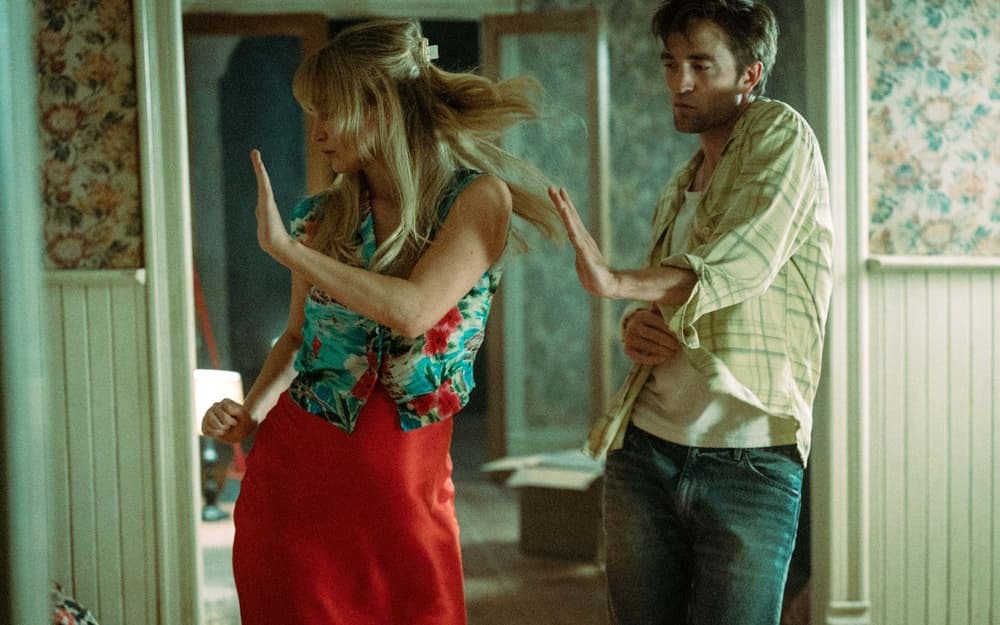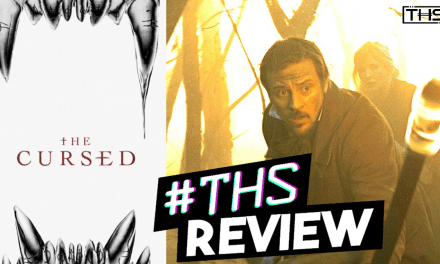Lynn Ramsey’s Die My Love is a film about the things we feel but can never find the words to express. It is a film which perfectly summarises all the thing women want to say, but the words do not exist for. An extraordinary depiction of postpartum depression, Die My Love is an experimental psychological drama about motherhood, womanhood, and mental health.
Jennifer Lawrence and Robert Pattinson are Grace and Jackson, a young couple who move from New York to an anonymous, rural part of America. Jackson has inherited a charming but weather-beaten home from his deceased uncle, which is close to his mother, Pam (Sissy Spacek), and Father Henry (Nick Nolte).
The couple is introduced as animalistic and primal. We first meet them moving into their home, a fixed-camera medium-wide shot watches them walk in and out, sing, dance, and have sex. They are the type of people who do what they want when they want, and living away from neighbours only encourages this.
Their spark has already been dimmed by the time their son arrives. Motherhood has made Grace even more naturalistic, prowling around the yard on all fours barefoot, lying in the grass, and generally feeling more comfortable when surrounded by nature. As Grace becomes highly sexual, connected to her inner animal, Jackson appears bored in the presence of his partner and child.

Grace doesn’t naturally take to being a stay-at-home mother while Jackson works part-time. She loves her unnamed child but finds the tasks of being a housewife thankless. A writer in some capacity, she has time, but no creativity, so she spends her days filling, overthinking, and creating scenarios she believes to be reality.
A man on a motorbike (a highly underused LaKeith Stanfield) in full motorcycle leathers lingers around their home, hinting at a more sinister side plot. Is this real or just a figment of Grace’s psychosexual fantasies? Die My Love lets these questions wash over the audience, putting you in Grace’s shoes. This is one of the many horror tropes Die My Love uses to explore Jackson and Grace’s relationship breakdown.
The last act of the film may take one turn too trippy for some audiences. It paints its conclusion with bold strokes and an unashamed lack of care about appeasing crowds. Perhaps there is one abstract scene too many in the final act, extending the runtime into a slightly unwelcome 118 minutes. Once the story seems to come to a natural conclusion, it adds another layer to the proceedings. Whether it needs this added scene or two or whether it should have stayed more ambigious, depends on the audiene’s perspective.
Despite the dark, uncomfortable subject matter, the film gives us glimpses of joy and laughter through the despair. Grace and Jackson can be wonderful together, which makes it all so tragic when they fight. Jackson’s mother and her friends laugh over dinner, their older parenting methods humorously outdated. Even amid her battles, Grace doesn’t lose her sharp wit, often delivering a hilarious line to an over-eager shop assistant or baby-obsessed friend. These moments of joy usually come before a well-placed shock, putting you into the mindset of the over-tired, overly bored couple.
Jennifer Lawrence gives one of the year’s most extraordinary performances as a woman on the edge. The actor bares her all, both physically and emotionally. Lawrence isn’t just playing a woman unravelling; she embodies every emotion. She has always been a star, unafraid to get weird on-screen, and Grace is Lawrence doing this to her best capabilities. She dances, she prowls, she walks around naked, she barks, she is a terrifying, sympathetic animal caught in a trap. It’s an uncomfortable performance you won’t be able to look away from.

Robert Pattinson plays down his role as Jackson. The actor has become known for these larger-than-life performances, but here, he strips it back. Jackson is as close as Die My Love gets to a villain, an unsympathetic man viewed through the eyes of his partner. Jackson is less a real person and more a target for Grace’s sorrow and anger. We never see him outside of who she sees him as, a smug, cheating manchild who refuses to admit responsibility for his actions.
Sissy Spacek and Nick Nolte bring their experience and charisma to their minimal screen time. Grace’s relationship with her grieving mother-in-law indicates that life and death might be as different as they seem. Some may say that Pam’s subplot is a distraction, but there is much symbolism in watching two women from different generations, at different stages of life, suffering from the same perils of womanhood. This relationship also proves Die My Love is more than a film about postpartum depression, it’s about grieving a stage of your life you can no longer go back to and a person you’ll never see again, whether that is yourself or someone else.
Die My Love is an uncomfortable film to settle into, but it’s at its best when disconcerting. The movie almost loses its charm when you start to settle into its rhythms. Ramsay presents Grace and Jackson’s lives in a non-linear order for no reason other than to confuse. The pair is introduced through a patchwork of incidents in life, all out of joint, like she is misremembering her own past. It’s chillingly recognizable for anyone who has ever struggled with their mental health and dissociated from their life.
Die My Love looks more like a horror film than a drama. Cinematographer Seamus McGarvey shoots rural America in a 4:3 aspect ratio, creating a stunning slice of American Gothic. There is a very specific Americana look to this film, appearing like it’s set in a much older era than it actually is. Occasionally, a character will use a mobile phone and remind you that this is the 21st century.
Writer/ director Lynne Ramsay must be applauded for not holding back in Die My Love with the concern or making anyone feel comfortable. The film is in your face with its portrayal of a woman unravelling mentally, going further and further until it becomes genuinely shocking. A horror film about the trauma of womanhood, it’s an extraordinary film and an extraordinary performance from Jennifer Lawrence.
For more Reviews, make sure to check back to That Hashtag Show.

![‘Die My Love’ – Jennifer Lawrence Gives Career Best Performance In Psychosexual Drama [Review]](http://18.211.146.234/wp-content/uploads/2025/10/80ab5600-9747-4c2e-ab64-6ac78e16ed38-1280x640.jpg)



![Pretty Little Liars: Original Sin – Episodes 1-3 [RECAP & REVIEW]](http://18.211.146.234/wp-content/uploads/2022/08/project_20220815_1014165-01-440x264.png)